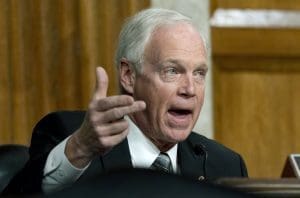Ron Johnson to run for Senate again after promising to limit himself to two terms
The Milwaukee Journal Sentinel once dubbed Johnson Wisconsin’s “most irresponsible representative” since Joseph McCarthy.

After months of ambivalence, Sen. Ron Johnson (R-WI) announced Sunday that he will seek reelection in November. After a narrow win in 2016, Johnson has spent much of his time in the U.S. Senate spreading misinformation about the effectiveness of COVID-19 vaccines and supporting former President Donald Trump’s agenda.
The Milwaukee Journal-Sentinel editorial board once called Johnson “the most irresponsible representative of Wisconsin citizens since the infamous Sen. Joseph R. McCarthy in the 1950s.”
With his announcement, Johnson broke a promise he made before he was elected to limit himself to two terms.
Last June, Johnson suggested he no longer felt bound by his word. “When I made that pledge I meant that pledge,” he explained to reporters. “I ran in 2010 because I was panicked for this nation. I’m more panicked today.”
In 2011, Johnson co-sponsored a constitutional amendment proposal to limit all senators to just two terms.
In recent months, Johnson has openly admitted that he does not really want to be a senator and that he “may not be the best candidate” for Republicans to run for the seat, which was previously held by progressive Sen. Russ Feingold (D-WI).
Last July, Johnson told a conservative podcaster, “I want to make sure that this U.S. Senate seat is retained in Republican hands. You see what the media’s doing to me. I may not be the best candidate. I wouldn’t run if I don’t think I could win, if I don’t think I was the best person to be able to win.”
He called the Senate “an incredibly frustrating place,” and said, “I feel really bad that I’ve been here now probably 11 years and we’ve doubled the debt. Obamacare’s still in place, and we’ve doubled the debt. I don’t feel like my time here has been particularly successful.”
In August, he told a conservative talk show host, “I’d rather be somewhere else. I’d rather do something else. I don’t want to — it’s not that I want to be a U.S. senator. I’m not seeking the title. It’s because I so love this country, as do Trump supporters.”
Johnson has made national news throughout the COVID-19 pandemic for pushing dangerous conspiracy theories about the virus and vaccines.
He railed against what he called “indiscriminate vaccination”; spotlighted unverified claims about coronavirus vaccine side effects; falsely claimed vaccines do not work; baselessly suggested gargling with mouthwash as a way to stop the coronavirus; and falsely claimed “over 19,000” deaths were linked to the inoculations.
Last week, Johnson argued that “natural immunity” was better than getting vaccinated. “Why do we think that we can create something better than God in terms of combating disease?” he asked conservative radio host Vicki McKenna.
Johnson has also defended the current tax system, saying the wealthiest 1% of Americans already pay their “fair share” in taxes, and pushed the racist “great replacement” conspiracy theory that holds that Democrats want lax immigration laws so that people of color coming across the border can outvote white Americans.
Several Democratic candidates have already announced their candidacy to take on Johnson in November. The race is expected to be competitive in a state that President Joe Biden narrowly won in 2020.
Published with permission of The American Independent Foundation.
Recommended

Ohio doctors fear effects of emergency abortion care case set to go before U.S. Supreme Court
A federal law that allows emergency departments to treat patients without regard to their ability to pay will be under U.S. Supreme Court scrutiny this week, and Ohio doctors are concerned about the case’s local impact on emergency abortion care.
By Susan Tebben, Ohio Capital Journal - April 23, 2024
House GOP votes to end flu, whooping cough vaccine rules for foster and adoptive families
A bill to eliminate flu and whooping cough vaccine requirements for adoptive and foster families caring for babies and medically fragile kids is heading to the governor’s desk.
By Anita Wadhwani, Tennessee Lookout - March 26, 2024
U.S. House Speaker Johnson says IVF should be protected — just not by Congress
U.S. House Speaker Mike Johnson said Thursday that it’s up to states and not Congress to preserve access to in vitro fertilization, weighing in on a growing national debate and campaign issue.
By Jennifer Shutt, States Newsroom - March 14, 2024








































































